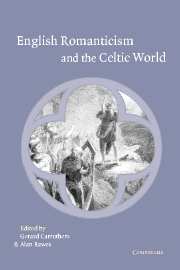Book contents
- Frontmatter
- Contents
- List of contributors
- Acknowledgements
- 1 Introduction: romancing the Celt
- 2 Sir William Jones, the Celtic Revival and the Oriental Renaissance
- 3 The critical response to Ossian's Romantic bequest
- 4 Blake and Gwendolen: territory, periphery and the proper name
- 5 The Welsh American dream: Iolo Morganwg, Robert Southey and the Madoc legend
- 6 Wordsworth, North Wales and the Celtic landscape
- 7 The force of ‘Celtic memories’ in Byron's thought
- 8 Shelley, Ireland and Romantic Orientalism
- 9 Byron and the ‘Ariosto of the North’
- 10 Scott and the British tourist
- 11 Felicia Hemans, Byronic cosmopolitanism and the ancient Welsh bards
- 12 Luttrell of Arran and the Romantic invention of Ireland
- 13 Contemporary Northern Irish poets and Romantic poetry
- Notes
- Bibliography
- Index
2 - Sir William Jones, the Celtic Revival and the Oriental Renaissance
Published online by Cambridge University Press: 22 September 2009
- Frontmatter
- Contents
- List of contributors
- Acknowledgements
- 1 Introduction: romancing the Celt
- 2 Sir William Jones, the Celtic Revival and the Oriental Renaissance
- 3 The critical response to Ossian's Romantic bequest
- 4 Blake and Gwendolen: territory, periphery and the proper name
- 5 The Welsh American dream: Iolo Morganwg, Robert Southey and the Madoc legend
- 6 Wordsworth, North Wales and the Celtic landscape
- 7 The force of ‘Celtic memories’ in Byron's thought
- 8 Shelley, Ireland and Romantic Orientalism
- 9 Byron and the ‘Ariosto of the North’
- 10 Scott and the British tourist
- 11 Felicia Hemans, Byronic cosmopolitanism and the ancient Welsh bards
- 12 Luttrell of Arran and the Romantic invention of Ireland
- 13 Contemporary Northern Irish poets and Romantic poetry
- Notes
- Bibliography
- Index
Summary
The Celtic Revival and the Oriental Renaissance have complex cultural, ethnological, political and poetical interconnections; each maximised the prestige of the peripheral and the colonial, establishing relationships with the ‘English’ coloniser which had the power to fascinate or repel, to consolidate or fragment metropolitan self-absorption. This cultural colonisation of the Occident by the Orient and of the Anglo-Saxon by the Celtic created an important part of the agenda for Romanticism and will constitute the area explored by this chapter.
William Jones, the Welsh Orientalist, argued that a Europe poetically saturated with a classical past should look eastward for new inspiration. His Enlightenment concern for accuracy of translation and comparative linguistic method created a demand for genuine Eastern products whilst significantly adjusting racial and political stereotypes. ‘On the Poetry of the Eastern Nations’ (1772) established Jones as a precursor of the Romantics, and his revision of pastoral involved not faint shepherds but the full-blooded Bedouin of the Moallakát (1782). In their irrepressible resistance to despotic power, the proud Yemeni nomads recall Gray's Welsh Bard, providing an Oriental displacement of Jones's Celtic genealogy. The infusing of a primitivist energy into the genre anticipates Wordsworth's Preface to the Lyrical Ballads. Similarly, Jones's ‘On the Arts, commonly called Imitative’ (1772) is remarkable for its proto-Wordsworthian definition of poetry as ‘originally no more than a strong and animated expression of the human passions’, an emotionalist concept of art prefiguring Romantic subjectivity.
Sir William Jones accomplished Oriental Renaissance in the West and cultural revolution in India.
- Type
- Chapter
- Information
- English Romanticism and the Celtic World , pp. 20 - 37Publisher: Cambridge University PressPrint publication year: 2003
- 3
- Cited by



